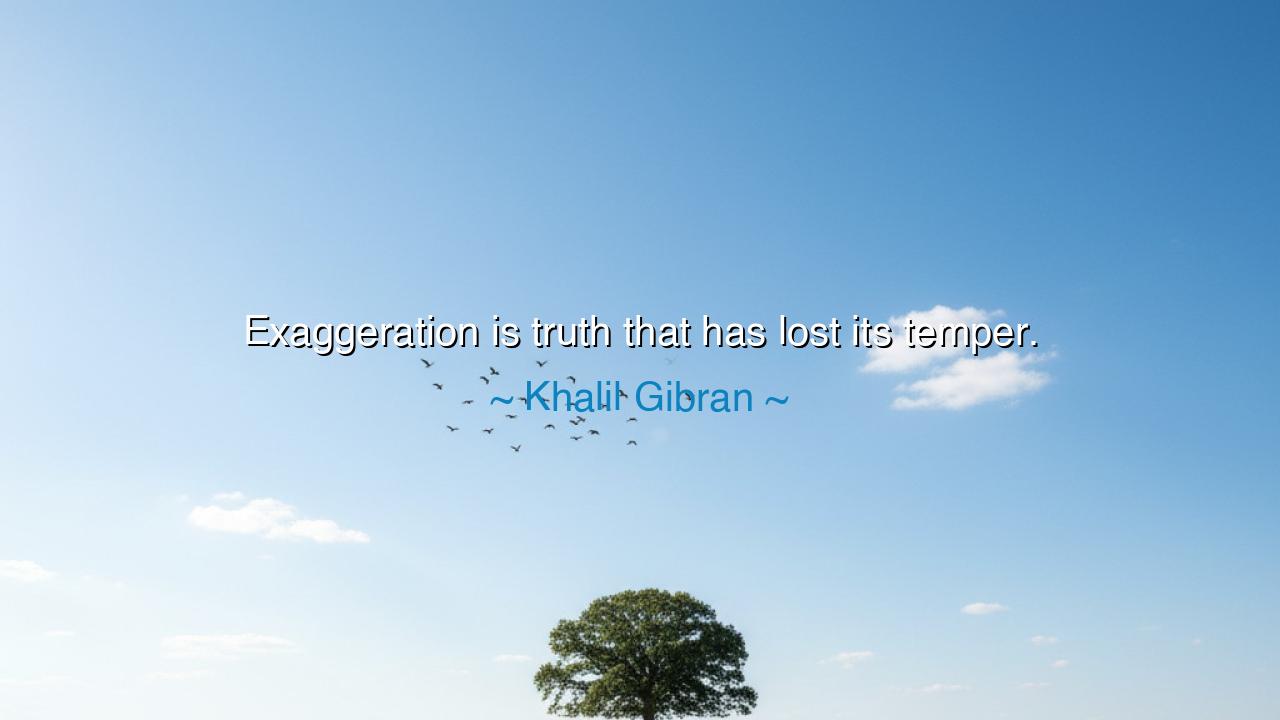
Exaggeration is truth that has lost its temper.






Khalil Gibran, the mystic poet whose words dance between the eternal and the earthly, declared: “Exaggeration is truth that has lost its temper.” In this saying, he reveals the delicate balance of speech, for truth is a flame that warms, but once it loses control, it burns too hot, distorting what it was meant to illuminate. To exaggerate is not to invent a lie outright, but to stretch truth until it becomes misshapen—no longer pure, no longer steady, but wild, swollen, and stripped of its grace.
In the wisdom of the ancients, truth was considered sacred, a gift from the gods and a bond among men. To twist it, even by exaggeration, was seen as dangerous. For truth is like a fine string—taut, strong, and clear. But pull it too far, and it snaps. Gibran’s words remind us that exaggeration is not harmless; it is truth pushed beyond its natural measure, truth that has been robbed of its calm dignity and made into a noisy shadow of itself.
History gives us many warnings of this principle. Think of the fiery speeches of the French Revolution. At first, they sprang from truth: the oppression of the poor, the cruelty of kings, the hunger of the people. But as the words grew hotter, as passion turned to rage, truth lost its temper and became exaggeration. Soon, what began as a call for liberty became a river of blood, and the guillotine silenced not only tyrants but also innocents. Here we see how exaggeration, born of truth, can consume itself and destroy the very good it sought to defend.
Yet exaggeration need not always end in tragedy. At times it simply leads to folly. Consider the merchant who boasts too loudly of his wares, claiming his goods will last a lifetime when in truth they will barely endure a season. He begins with some truth—that his craft is sound—but his exaggeration breaks trust. The buyer, once deceived, does not return. Thus the merchant has harmed himself by letting truth lose its temper. Trust, once broken, is far harder to repair than a sale lost in honesty.
The heart of Gibran’s saying is a call to temperance. To speak the truth with clarity is a noble act; to inflate it with exaggeration is to rob it of power. For exaggeration may stir emotions, but it does not build lasting conviction. Like thunder without rain, it makes noise but leaves the ground dry. Truth, steady and measured, penetrates more deeply than all the shouts of exaggeration. It is the still river, not the raging flood, that nourishes the fields.
The lesson, then, is clear: guard your speech. Let your words carry truth, but keep them free of the fever that distorts. When you are tempted to exaggerate to win an argument, pause and trust that the plain truth, spoken with dignity, will endure longer than the most dazzling boast. When you feel passion rising, temper it, so that truth may remain unclouded. For in the end, it is the quiet honesty of truth that wins trust, not the shrill cries of exaggeration.
Practically, this means living with discipline in both speech and action. In daily life, resist the urge to embellish your stories for attention, or to stretch your claims for advantage. Speak plainly, act steadily, and let truth shine in its natural strength. In debate, let reason guide your tongue, not anger. In persuasion, let honesty be your ally, not exaggeration. For those who cling to truth with calmness will find that their words outlast the storms of passion.
Thus, let us remember Gibran’s wisdom: exaggeration is truth that has lost its temper. Do not let your truth lose its temper; do not let your words, born of light, be twisted into shadows. Instead, guard the flame of truth with patience, and it will illumine both your path and the paths of those who come after you.






LLee
This quote makes me think about how often we use exaggeration in conversations. Is it always a negative thing, or can it serve as a form of expression, meant to emphasize an emotion rather than change the core of the truth? I’m curious about the role of exaggeration in storytelling. Does it truly distort reality, or does it just highlight a deeper emotional truth?
MTNguyen Le Minh Tri
I wonder if Gibran is suggesting that exaggeration can sometimes be an escape from the discomfort of facing the unembellished truth. Could it be that we exaggerate when we're afraid that the simple truth won’t have the same impact or emotional weight? Does exaggeration make the truth more palatable, or does it diminish its credibility? It’s a complicated dynamic, don’t you think?
QNHoang Quynh Nga
What’s the fine line between exaggeration and truth? Can exaggeration ever reveal more than it hides? It seems like Gibran is saying that when we exaggerate, it’s a sign that we’ve lost our calm and the actual truth gets distorted. But isn't it possible that exaggeration can also be a tool to emphasize important aspects of truth, even if it's not perfectly accurate? I'd love to hear thoughts on this perspective.
HNMinh Hieu Nguyen
Isn't it fascinating how exaggeration can sometimes highlight the core of a truth that’s difficult to accept? We all tend to stretch the truth to make a point, but when we lose our temper in doing so, is it still considered truthful? How often do we exaggerate because we’re frustrated or passionate about something? It's an interesting take on how emotions influence our perception of truth.